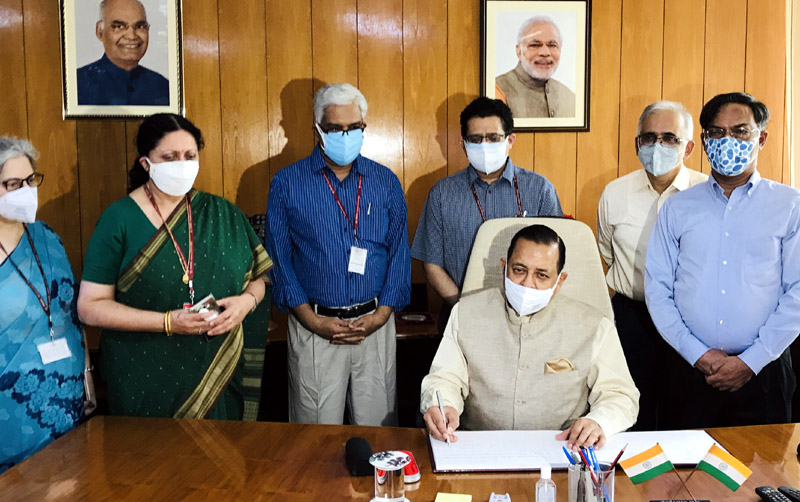
Excelsior Correspondent
NEW DELHI, July 8 : Union Minister Dr Jitendra Singh said today that India’s scientific fraternity is capable of leading the world.
Speaking to media after assuming charge of two new Union Ministries, namely Ministry of Science & Technology (Independent Charge) and Ministry of Earth Sciences (Independent Charge), Dr Jitendra Singh who is also MoS PMO, Personnel/DoPT, Public Grievances, Pensions, Atomic Energy and Space said, Prime Minister Narendra Modi accords highest priority to scientific pursuits, takes personal interest in all the new scientific initiatives and at the same time, is also keen that new scientific breakthroughs should be applicable in bringing about “Ease of Living” for the common man. He said that with the support of India’s eminent scientific fraternity, it shall be his earnest endeavour to realise Modi’s goal of raising India’s scientific capabilities to new heights.
Dr Jitendra Singh recalled that nearly seven years ago, he had the opportunity of briefly heading the same Ministry and, therefore, he shall try to carry forward various projects in the pipeline and also plan new ones which could be best suited to the requirements of contemporary Indian society.
The Minister was given a powerpoint presentation and briefed about the key initiatives and policy issues of the Ministry by the Union Secretary Science & Technology, Professor Ashutosh Sharma and Director General CSIR, Dr Shekhar Manda. A presentation on the COVID-19 Mitigation Initiatives was also made on the occasion.
DG, CSIR informed that since the early days of pandemic, CSIR has worked with focused strategy to deliver various interventions and products towards mitigation of Covid-19 in the country which falls broadly into five verticals: Diagnostics; Surveillance; Drugs and Vaccines; Devices and PPEs and Supply Chain and Logistics. In the area of diagnostics. CSIR has developed a novel diagnostic called FELUDA which is CRISPR-Cas based method and is licensed to TATA Sons and currently marketed as TATA-MD CHECK and is widely deployed. Dry Swab based direct RT-PCR diagnostic without RNA isolation has been developed and technology transferred to several industries. In addition, 13 laboratories of CSIR have carried out more than 14,50,000 COVID-19 tests so far. CSIR is supporting testing at Leh by providing instruments and training for testing.
CSIR is actively involved in genomic surveillance as an active partner of INSACOG consortium and till date more than 20,000 sequences have been done by CSIR alone as part of INSACOG. Further CSIR is also partnering with states such as Kerala and Maharashtra for genomic surveillance. Sewage surveillance has also been optimized by CSIR and carried out in several cities. CSIR is carrying out a large scale serological survey of its staff, scientists, researchers etc in all 37 labs across the country.
Towards developing drugs for treatment of COVID-19 CSIR is carrying out clinical trials of repurposed drugs in partnership with Industry. It also licensed process technology of Favipiravir to Cipla which led to launch of Ciplenza. CSIR is working on 5 clinical trials of AYUSH formulations for treatment of Covid-19 with Ministry of AYUSH.
On the devices front, CSIR has developed indigenous Medical Grade Oxygen Concentrator based on advanced PVSA technology which is suitable for 24/7 operations in hospitals and has a scalable design of 100-500 Liters Per Minute (LPM). Along with DRDO, which is setting 500 Oxygen plants, CSIR- IIP technology licensed industry partners will set up 120 plants by July 2021 and will be funded through PM-CARES.
Non-invasive ventilation device, SwasthVayu has been developed which is cost effective, easy to use in makeshift hospitals, wards and dispensary. The technology has been licensed to seven industry partners and more than 1300 pieces have been manufactured and supplied with 1200 pieces to Delhi Government alone.
Modular UV disinfection technology has been developed for rooms, HVAC systems in malls, offices etc has been developed which is useful for disinfection of SARS-CoV-2.
To cater to the increased demand for hospitals, CSIR is working on building, makeshift hospital/expand facilities and so far 11 hospitals have been set up at different places in the country including Himachal Pradesh, Tamil Nadu, Uttar Pradesh, etc. Recently, makeshift hospitals have been set up at Safdarjung Hospital and at Lady Harding (total of 300 beds) in New Delhi.
To address the various supply chain challenges, CSIR has developed a one stop platform called “Arogyapath” for health care supplies which is currently hosted on National Health portal.

